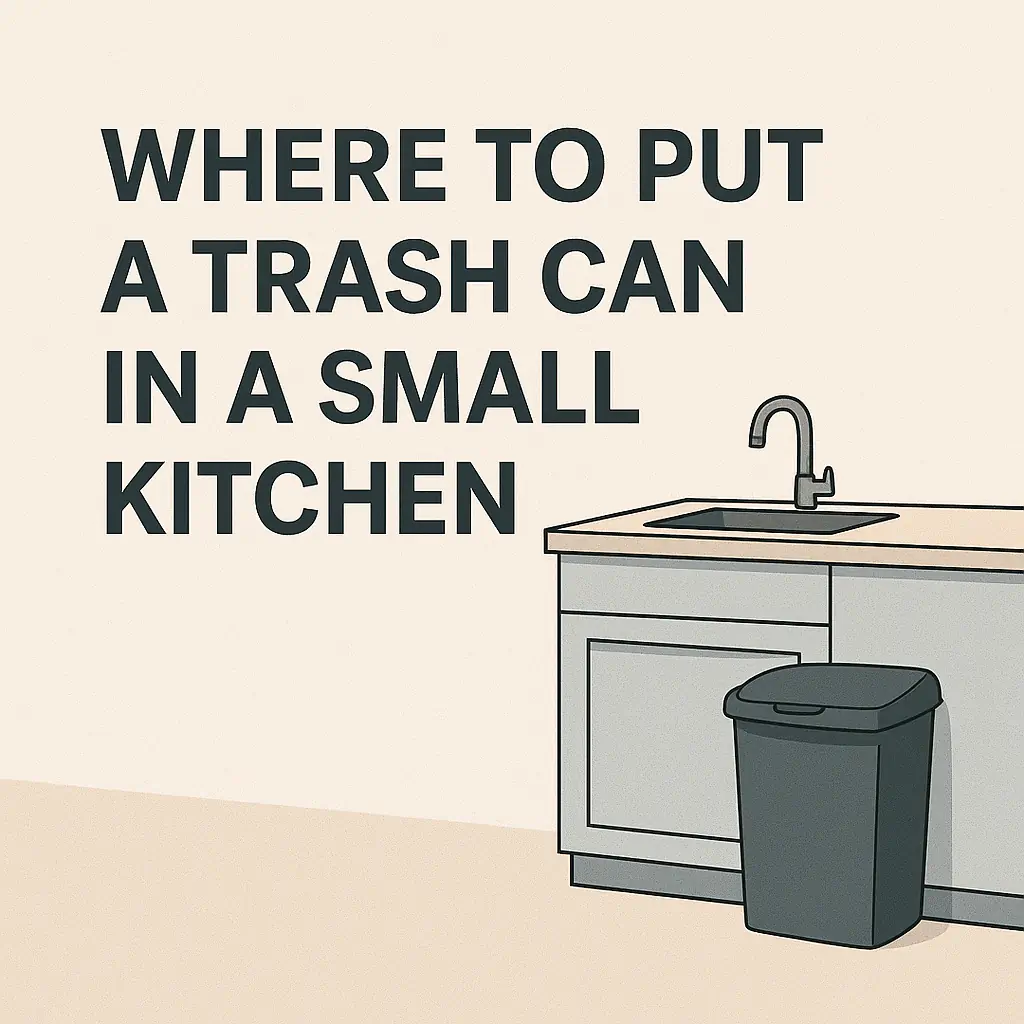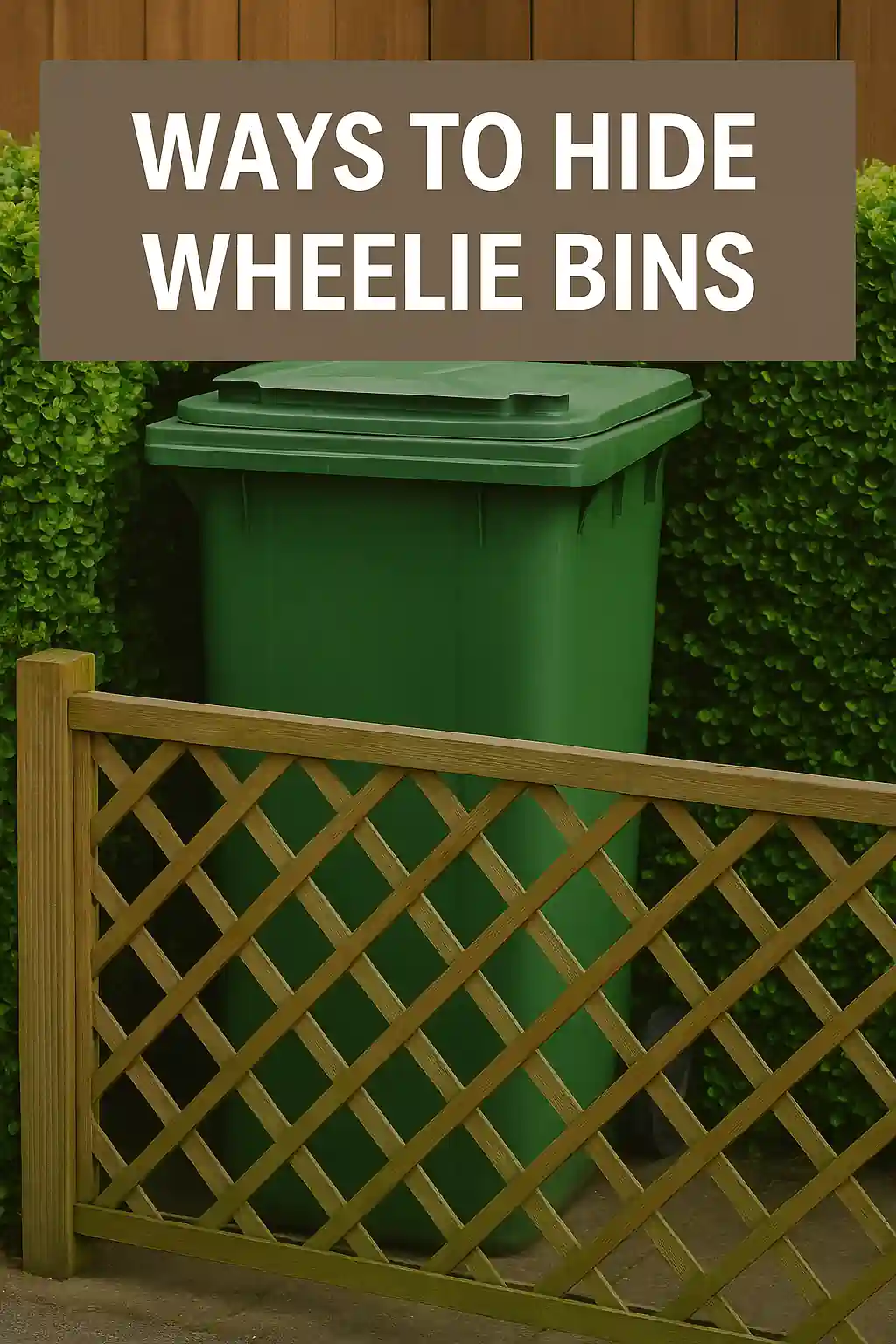How to Deodorize and Clean Outdoor Garbage Cans: Easy Tips to Stop Trash Can Odor
Outdoor garbage cans are essential for keeping waste out of your home, but they often come with an unpleasant side effect, the smell. Whether it’s summer heat, leftover food, or leaky trash bags, the odor can quickly become overwhelming. Thankfully, there are easy and effective solutions. In this guide, you’ll learn everything about deodorizing garbage cans outdoors, cleaning techniques, natural remedies, and how to stop the smell for good.
An audible narration 🎧 is available for this article. Listen to our podcast below, it’s FREE:
Why Do Garbage Cans Smell So Bad?
Before diving into the solutions, it’s important to understand the source of the problem. Outdoor garbage cans start to stink for several reasons. Decomposing organic waste, such as meat, dairy, and fruit, produces foul-smelling gases. Moisture from leaky bags or rainwater can collect inside, creating a breeding ground for bacteria. Warm temperatures intensify these issues, and when air can’t circulate properly, the smell becomes trapped. Worst of all, if the can is rarely cleaned, residue builds up over time and leads to a persistent stench.
Animals such as raccoons, cats, and rats are also attracted to these smells and can rummage through or knock over cans, spreading trash and bacteria. These health hazards make it even more necessary to regularly clean and deodorize your bins.
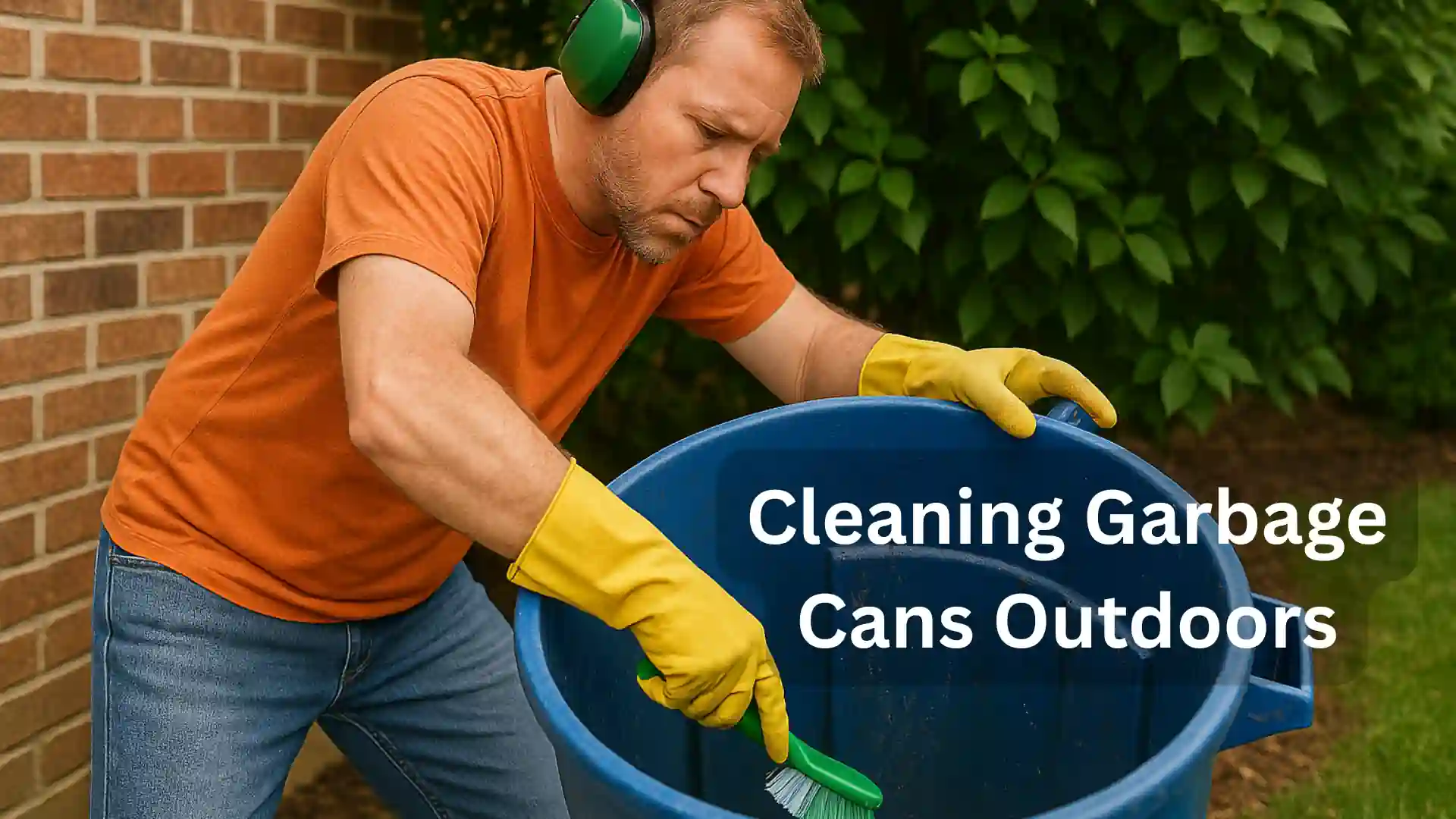
How to Clean Outside Trash Cans Properly
Cleaning garbage cans outdoors is the first and most important step in controlling odor. Here’s how to do it thoroughly:
Step 1: Empty the Trash Can
Start by emptying the trash can completely. Remove liners or bags and shake out any loose debris. If there’s any stuck waste at the bottom, use a small shovel or scraper to dislodge it.
Step 2: Rinse the Interior
Grab your garden hose and rinse the inside of the can, especially the corners and bottom where grime tends to build up. If your hose has a high-pressure setting, use it to loosen stuck-on gunk. A pressure washer works best if available.
Step 3: Scrub with Soapy Water
Fill a bucket with hot water and dish soap. To boost its cleaning power, add a cup of white vinegar or a few tablespoons of baking soda. Use a long-handled brush to scrub all surfaces, inside walls, the bottom, and the lid. Let the soapy solution sit for 10–15 minutes if needed.
Use circular motions to scrub stubborn spots, and if possible, flip the can on its side to reach every part more easily. Don’t forget the lid, this is often overlooked but can harbor a lot of bacteria.
Step 4: Neutralize Odor
Once clean, deodorize the can by sprinkling baking soda inside. For deeper odor elimination, pour in a vinegar and baking soda mix, let it fizz, and scrub again. You can also use lemon juice for a more pleasant smell.
Step 5: Rinse and Dry
Rinse thoroughly with clean water. Let the can air dry upside down in the sun, which acts as a natural disinfectant. Repeat this process every couple of weeks or after disposing of particularly smelly waste.
Best Ways to Deodorize Garbage Cans Outdoors

After cleaning, you’ll want to keep your can fresh. Here are effective strategies:
Use Natural Absorbers
One of the easiest ways is to sprinkle baking soda at the bottom of your bin after every trash pickup. It helps absorb moisture and neutralize smells. You can also use kitty litter or activated charcoal for similar results.
Try Commercial Deodorizers
You can also use commercial trash deodorizers, which are available in gel packs, charcoal pads, or scented liners. These options offer long-lasting freshness with minimal effort. Look for eco-friendly and non-toxic products if you have pets or children at home.
Line the Bottom with Absorbent Materials
Another simple tactic is to line the base of your can with old newspapers or cardboard. These materials soak up leaks and can be tossed away easily. You can also use compostable liners or mats designed for trash cans.
Upgrade to a Sealed Can
If your can doesn’t have a tight-fitting lid, upgrade it. A sealed lid keeps smells in and pests out. Explore smart covered bin options in our storage category. Locking lids are also great for keeping animals from tipping the cans over.
Store in a Cool Spot
Lastly, store your trash can in a shaded area to avoid heat buildup. Sunlight accelerates odor-causing bacteria. For more ideas, check out these 25 outdoor garbage can storage ideas.
Bonus Tip: Freeze Problem Waste
If you have leftovers like fish bones, shrimp shells, or greasy meat scraps, wrap them in a bag and store them in the freezer until trash day. This prevents the most pungent smells from ever reaching your bin.
How to Deodorize Kitchen Trash Can
Don’t forget about your indoor bins. To prevent odors in your kitchen trash can, dispose of food waste daily and rinse containers before tossing. Add natural fresheners like citrus peels or cinnamon sticks. You can also use scented liners or cotton balls with essential oils.
Cleaning should be done at least weekly. If you cook frequently or have a large family, you may need to clean more often. Consider using a lidded can with a step-pedal to keep smells contained. Keep the trash can in a well-ventilated spot, away from heating sources.
How to Stop Odor in Trash Can Long-Term
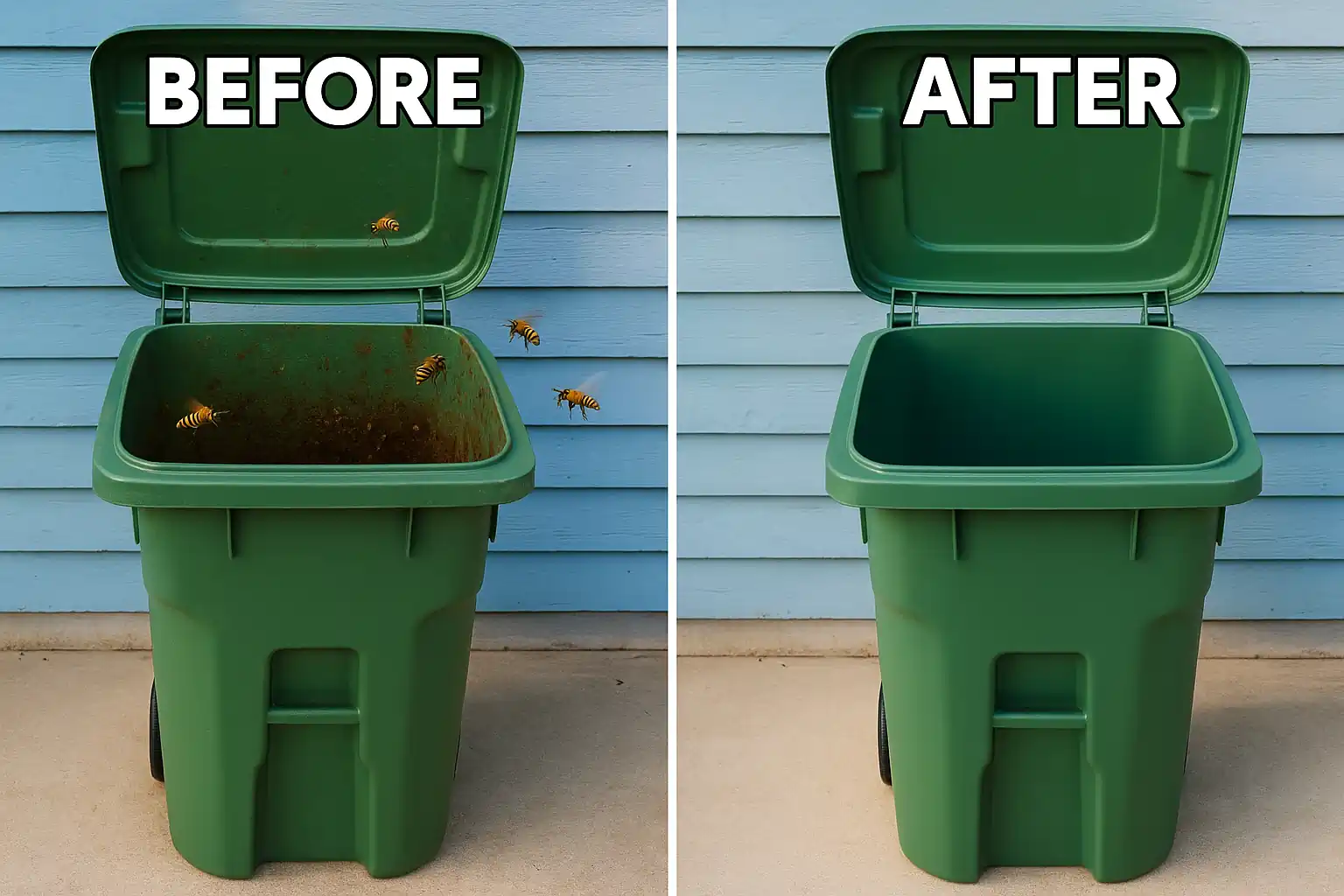
To keep garbage cans odor-free in the long run, make odor control a habit. Freeze extra-smelly items like fish scraps until trash day. Double-bag items such as pet waste or diapers. Clean the bin monthly and allow it to dry completely before putting in a new liner. Rinse food containers before throwing them out. Each small action helps reduce buildup and odor.
Additionally, be strategic about trash day. Don’t overfill the can or leave bags sitting for multiple days in warm weather. Try to time your cleaning just after pickup to start fresh.
Natural DIY Deodorizers for Trash Cans
Prefer eco-friendly options? Try these homemade deodorizing solutions:
Vinegar Spray
Mix equal parts white vinegar and water. Spray this inside the can after cleaning to kill bacteria and neutralize smells. You can also add a few drops of tea tree or eucalyptus oil for extra cleaning power.
Lemon and Baking Soda Pack
Place lemon peels and baking soda in a sock or pouch and drop it into the bin. It provides a fresh scent while absorbing odors. Replace every week or two.
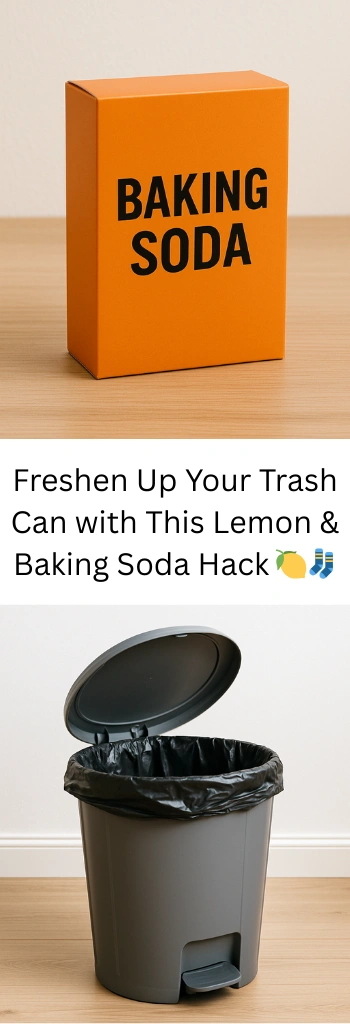
Coffee Grounds
Used coffee grounds are another great absorber of odors. Let them dry out and place them in a paper filter or breathable pouch. This method also helps repel insects.
Essential Oil Cotton Balls
Soak cotton balls in essential oils like lavender, eucalyptus, or lemon and place them in your trash can. Replace weekly for best results. These are ideal for indoor bins too.
Cleaning Garbage Cans Outdoors in Winter
Winter cleaning is trickier due to freezing water. Try to clean your bin during the warmest part of the day. Mix hot water and vinegar to help prevent freezing. Dry the bin with towels afterward and, if possible, store it in a garage to protect it from the cold.
Also, avoid pouring hot water directly on frozen plastic as it might crack. Instead, bring the bin inside for a short while if needed, then proceed with cleaning.
Final Tips for Odor Control
Use gloves when handling trash or cleaning the bin. If animals are a concern, sprinkle cayenne pepper around the can to deter them. Never pour liquids into trash bags, as this causes leaking and bacteria growth.
Consider composting kitchen waste like fruit peels and vegetable scraps. Compost bins offer a sustainable way to reduce your trash load while improving your garden. You can even repurpose old trash bins into DIY composters.
Make a trash schedule and clean your bins routinely, not just when they begin to stink. Keeping a calendar reminder can go a long way in staying consistent.
Keeping outdoor garbage cans clean and odor-free doesn’t have to be a chore. With regular cleaning, smart deodorizing tactics, and better storage, you can control smells easily and maintain a more pleasant outdoor space. From natural remedies like baking soda and vinegar to commercial deodorizers and smart storage ideas, the key lies in being proactive.
By taking small steps each week, you can extend the life of your garbage can, avoid attracting pests, and make your home feel fresher overall.

